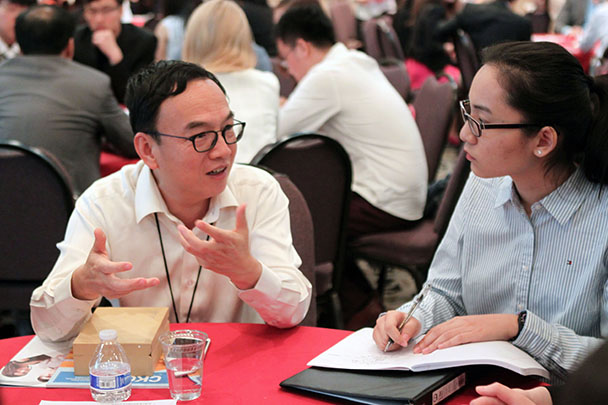At the 3rd Annual USC China Connect Forum in Los Angeles, CKGSB Professor Mei Jianping highlighted five main sectors which are set for promising futures in China.
Associate Dean of EMBA and Professor of Finance of Cheung Kong Graduate School of Business Mei Jianping delivered a special lecture on “Investment Opportunities in China’s Economic Transformation” at the 3rd Annual USC China Connect Forum on April 12, 2015, in Los Angeles, California. CKGSB was a strategic knowledge partner at the forum. CKGSB and USC’s School of Cinematic Arts have also partnered for an EMBA in Culture and Creativity, which began its first intake last fall (click here for more details in Chinese).

CKGSB Associate Dean of EMBA and Professor of Finance Mei Jianping at the USC China Connect Forum on April 12, 2015, in Los Angeles.
Using the “Health and Wellness” concept as a guiding theory, Mei shared his observations about China’s economic transformation, healthy social development and improvements in the quality of daily life. He also expressed his confidence that China’s economy would immerse itself even deeper in the mainstream world economy.
Afterwards, Dr. Mei joined a roundtable discussion with 300 attendees, including executives of well-known international enterprises, professional elites and foreign students. He shared in-depth insights about different industries and answered questions about entrepreneurship, work and study.
Professor Mei pointed out that after decades of rapid growth, China’s economic growth has slowed and has entered a period of economic transformation. He said China is currently facing the issues of overcapacity, an aging labor force, lower rates of growth, debt and other problems.
Compared to the present situations in the US, Europe and Japan, where liquid assets are far greater than GDP, Mei said the ratio of China’s liquid assets to GDP are too low. Its bank lending system also lags behind the needs of economic development, causing the popularity of high-interest interpersonal loans and restricting economic development.
In view of these issues, Professor Mei had the following suggestions:
Professor Mei further highlighted five industries with promising futures in China: domestic and overseas M&As; film, television and media products; health and wellness concepts and medical care; modern agriculture and credit systems; and industries related to the Internet and big data.
During the roundtable discussion, Professor Mei said China would have many bankruptcy reorganization and overseas M&A opportunities in the future, which would require a lot of financial talents. He also pointed out that the healthcare sector is in desperate need of talent. Even though it now only occupies 5% of China’s GDP, its will continue to develop, likely reaching about 15% to 17%.
During the question-and-answer session, a female student from the University of Southern California proposed the idea to develop organic foods in China, which gained Professor Mei’s approval. He said that if you could find the equivalent of about 1,650 acres of land and develop modern, pollution-free organic agriculture, and then add the insurance industry in, this would be a great modern agriculture development model.
Regarding the real estate investment topics that many young people were concerned about, Professor Mei believed that rigid demand in China’s real estate market will be far less than it is in the United States. Some research predicts that between 2010 and 2040, the growth rate of the younger population in China will be minus 33%, compared with 22% in the US. His advice was that the young generation “should not necessarily buy a home.”